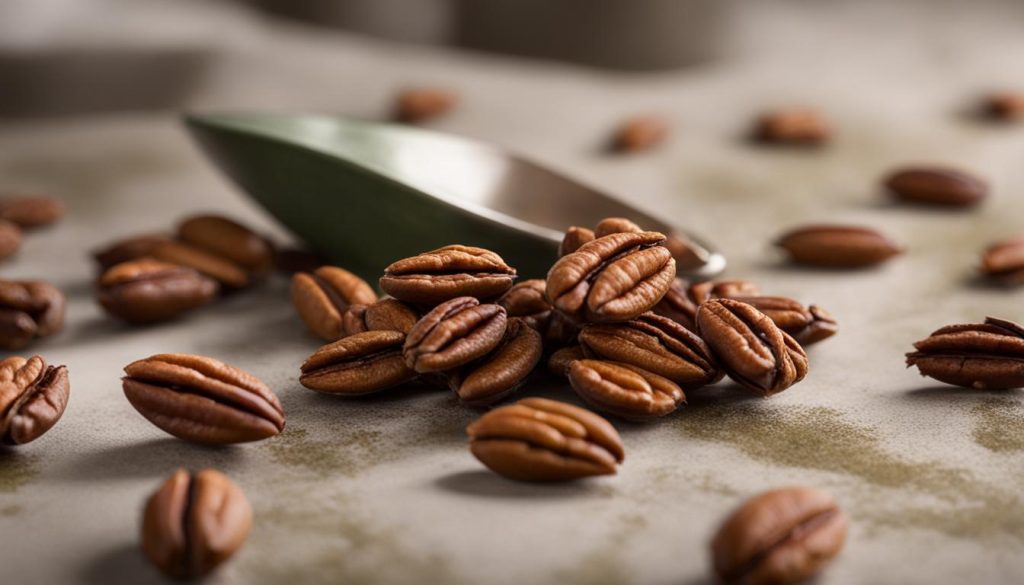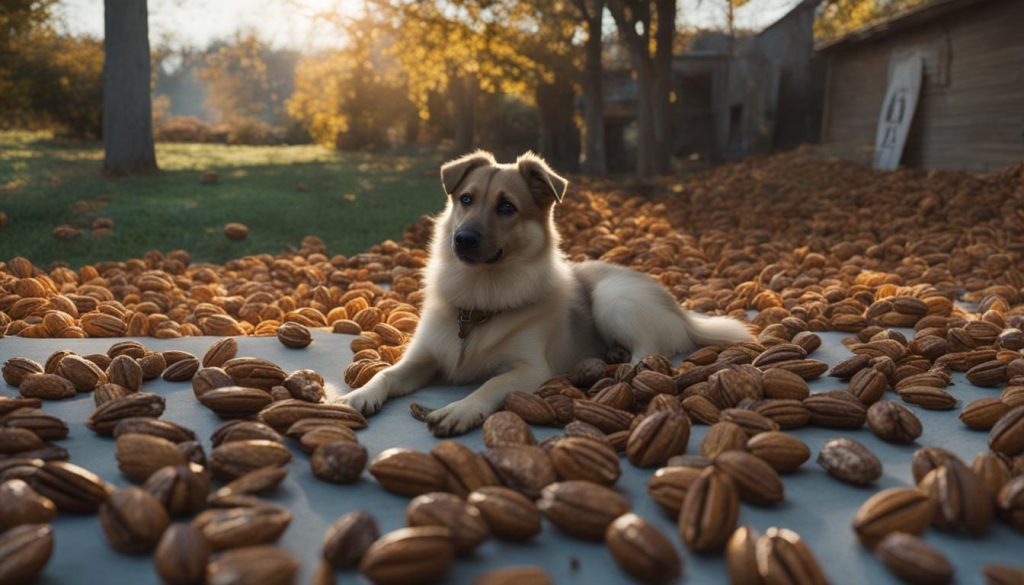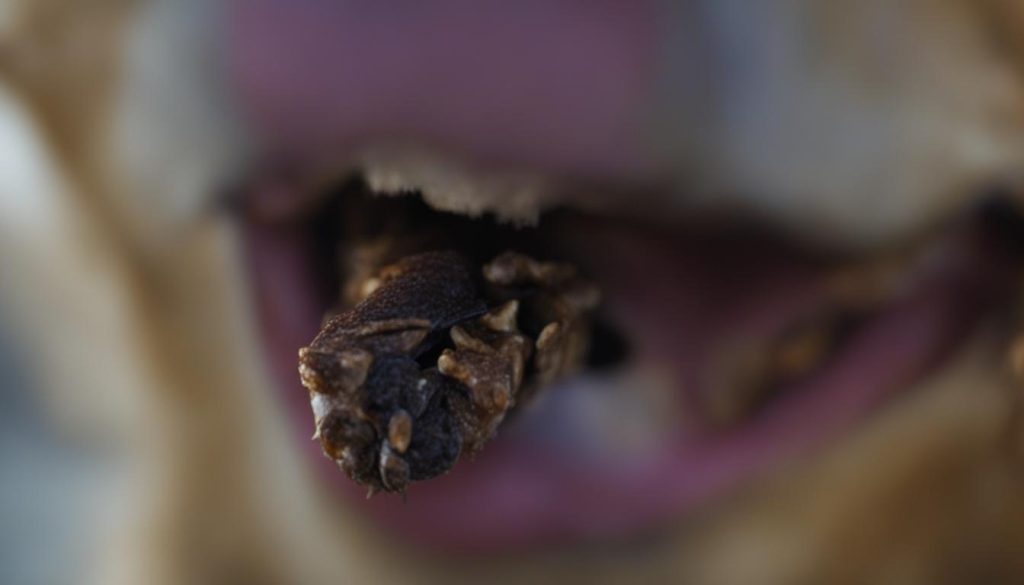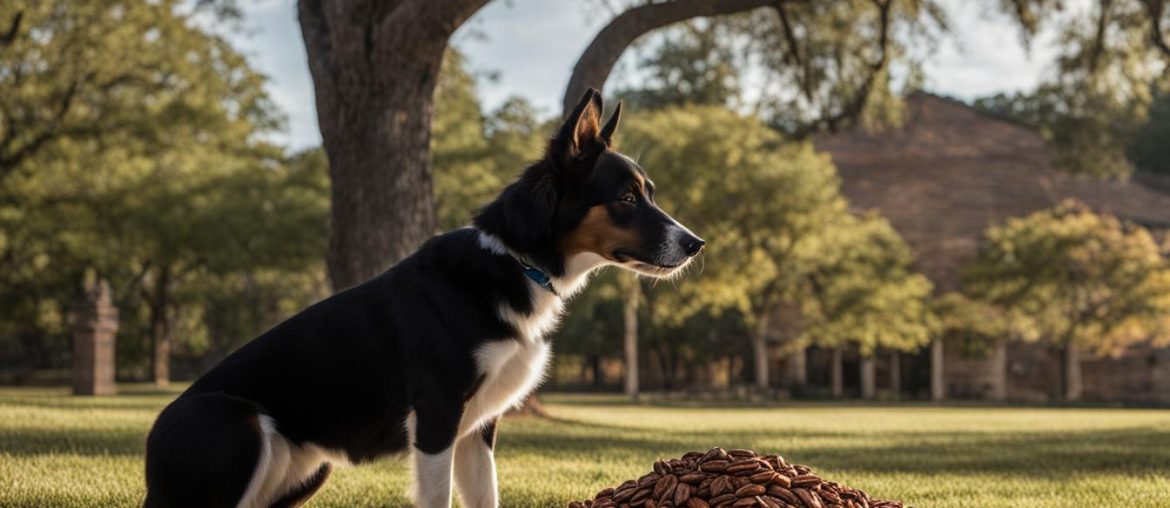Giving our furry friends a treat from time to time is a joyous part of being a dog owner. But when it comes to sharing our favorite human snacks with them, caution is necessary. One such snack that raises questions is pecans. Can dogs have pecans? Is it safe to feed them this delicious nut?
Feeding pecans to dogs is not recommended. Pecans contain a compound called juglone, which is toxic to dogs and can lead to severe vomiting and digestive problems. Additionally, pecans can harbor molds that are harmful to dogs if ingested. The high fat content of pecans also puts dogs at risk of developing pancreatitis, a dangerous inflammation of the pancreas. Lastly, the small size of pecans poses a choking hazard for dogs.
If your dog happens to eat pecans, it is important to contact a veterinarian immediately for guidance. They will be able to assess the situation and recommend appropriate steps to ensure your dog’s well-being.
Key Takeaways:
- Feeding dogs pecans is not safe due to the presence of juglone, molds, and the high fat content.
- Pecans can cause severe vomiting, digestive problems, and even pancreatitis in dogs.
- The small size of pecans poses a choking hazard for dogs.
- If your dog ingests pecans, seek veterinary care immediately.
- Choose dog-friendly alternatives like peanuts, cashews, almonds, or peanut butter (without added sugars or xylitol).
Why are Pecans Bad for Dogs?
Pecans are dangerous for dogs due to several factors that can negatively affect their health. One key reason is the presence of a compound called juglone in pecans, which is toxic to dogs and can lead to neurological issues. When ingested, juglone can cause severe vomiting and digestive problems, putting the dog’s overall well-being at risk. Additionally, pecans can contain molds that are toxic to dogs if consumed, further exacerbating the potential harm.
Another important consideration is the high fat content of pecans, which can cause pancreatitis in dogs. Pancreatitis is an inflammation of the pancreas and can result in symptoms such as vomiting, diarrhea, loss of appetite, and lethargy. In severe cases, pancreatitis can be life-threatening. Therefore, it is crucial to avoid feeding pecans to dogs to prevent this serious condition.
Furthermore, the small size and hard texture of pecans pose a choking hazard for dogs. Accidental swallowing of whole pecans can lead to intestinal blockages, which may require surgical intervention to remove. Intestinal blockages are not only painful for dogs but can also be life-threatening. Therefore, it is essential to keep pecans out of your dog’s reach and opt for safer alternatives.
It is important to remember that pecans can have detrimental effects on canine health, ranging from toxicity and mold ingestion to pancreatitis and choking hazards. To ensure the well-being of your furry friend, it’s best to avoid feeding them pecans altogether and provide them with dog-friendly treats and snacks that are safe and beneficial to their health.

Symptoms and Risks of Dogs Eating Pecans
Dogs that consume pecans may exhibit a range of symptoms indicating potential health risks. One of the most common symptoms is severe vomiting, which can be persistent and may require medical intervention. Another symptom is diarrhea, which can be accompanied by abdominal discomfort and dehydration. It is important to note that these symptoms can vary in severity depending on the quantity of pecans ingested and the individual dog’s sensitivity. In some cases, dogs may not show immediate symptoms but can develop long-term health issues if pecans are consumed regularly.
Aside from gastrointestinal symptoms, mold toxicity is another significant risk associated with dogs eating pecans. Pecans are prone to mold growth, and if ingested, these molds can release toxic compounds that affect a dog’s nervous system. This can lead to neurological symptoms such as seizures, tremors, and disorientation. Mold toxicity should be taken seriously as it can have long-lasting effects on a dog’s overall health.
Furthermore, pancreatitis is a potential risk for dogs that consume pecans. Pecans have a high-fat content, which can trigger inflammation of the pancreas and result in pancreatitis. This condition can be life-threatening and requires immediate veterinary care. Symptoms of pancreatitis include vomiting, abdominal pain, loss of appetite, and lethargy. It is crucial to monitor a dog’s behavior closely and seek veterinary assistance if any of these symptoms are present after consuming pecans.
| Symptoms of Dogs Eating Pecans | Risks of Dogs Eating Pecans |
|---|---|
| Vomiting | Gastrointestinal issues |
| Diarrhea | Mold toxicity |
| Abdominal discomfort | Pancreatitis |
| Dehydration | |
| Seizures | |
| Tremors | |
| Disorientation |
It is essential to remember that prevention is the best approach when it comes to the well-being of our canine companions. Avoiding the consumption of pecans altogether can help eliminate the associated risks. If you suspect that your dog has eaten pecans or is exhibiting any related symptoms, it is crucial to seek veterinary advice promptly. Early intervention can prevent further complications and provide appropriate treatment to ensure your dog’s health and safety.

Toxic Mold and Pecans
Pecans are not only harmful to dogs due to their toxic compounds but also because they are susceptible to growing mold. Mold growth on pecans can pose additional health risks to dogs, as it can contain mycotoxins. These mycotoxins can lead to neurological issues and other health problems when ingested by dogs.
“Moldy pecans can have serious consequences for dogs, including tremors, seizures, and other neurological issues,”
Mold growth on pecans primarily occurs on the shells. As the pecans mature and the shells crack, it creates an ideal environment for mold to grow. One specific mold that can be found on pecan shells is Aspergillus, which produces a toxic substance called aflatoxin. Aflatoxin is known to be harmful to dogs and can negatively impact their health if they consume moldy pecans.
To prevent the ingestion of moldy pecans, it is crucial to store pecans properly in a cool and dry place. Avoid exposing the nuts to moisture, as it can facilitate mold growth. Additionally, always inspect pecans before giving them to your dog as a treat, and discard any nuts that show signs of mold or discoloration.
| Mold Type | Effect on Dogs |
|---|---|
| Aspergillus | Produces aflatoxin, which can cause toxicity and various health issues |
| Other molds | May contain mycotoxins that can lead to neurological problems |
It is important to prioritize your dog’s safety by avoiding the consumption of moldy pecans. Instead, opt for dog-friendly alternatives like peanuts, cashews, and almonds as occasional treats. Always consult with your veterinarian for specific dietary recommendations for your dog.

Pecans and Pancreatitis in Dogs
Pecans, with their high-fat content, can pose a risk of pancreatitis in dogs. Pancreatitis is an inflammation of the pancreas that can cause vomiting, diarrhea, loss of appetite, and lethargy in dogs. If you suspect that your dog has ingested pecans or is showing signs of pancreatitis, it is important to seek veterinary care immediately.
Symptoms of pancreatitis in dogs can vary, but they often include abdominal pain, hunched posture, and a tense or distended abdomen. In severe cases, pancreatitis can lead to organ failure and even be life-threatening. Prompt diagnosis and treatment are crucial to manage the condition and prevent further complications.
When seeking veterinary care, it is helpful to provide information about your dog’s diet and any potential exposure to pecans or other high-fat foods. Your veterinarian may perform blood tests, imaging, and other diagnostic procedures to confirm pancreatitis and determine the best course of treatment. In most cases, treatment involves supportive care, such as fluid therapy, pain management, and a low-fat diet.
Table: Symptoms of Pancreatitis in Dogs
| Symptom | Description |
|---|---|
| Vomiting | Recurrent episodes of vomiting that may be accompanied by abdominal pain. |
| Diarrhea | Loose or watery stools that may contain blood or mucus. |
| Loss of Appetite | Reluctance or refusal to eat or a decreased interest in food. |
| Lethargy | Decreased energy levels, excessive tiredness, and lack of interest in usual activities. |
| Abdominal Pain | Tenderness or discomfort in the abdomen, often exhibited through restlessness or a hunched posture. |
If you suspect that your dog has pancreatitis or if you have any concerns about their health, it is always best to consult with a veterinarian. They can provide proper guidance, diagnosis, and treatment to ensure the well-being of your furry companion.

Choking Hazard of Pecans
Pecans pose a significant choking hazard for dogs due to their small size and hard texture. Dogs may accidentally swallow whole pecans and experience dangerous intestinal blockages as a result. These blockages can be life-threatening and often require surgical intervention to remove. It is crucial for pet owners to be aware of the potential choking risk posed by pecans and take proactive measures to keep them out of their dog’s reach.
Ingesting pecans can lead to serious health complications for dogs, and the risk of choking is just one aspect to consider. As mentioned earlier, pecans contain a compound called juglone, which is toxic to dogs and can cause neurological issues. They also contain molds that can be harmful if ingested. Additionally, the high fat content in pecans can lead to pancreatitis in dogs, which is a painful and potentially life-threatening condition.
Table:
| Pecans as a Choking Hazard for Dogs | Size of Pecans and Choking Risk | Intestinal Blockages from Pecans |
|---|---|---|
| Due to the small size and hard texture of pecans, they can easily become lodged in a dog’s throat, posing a choking hazard. | The small size of pecans increases the risk of choking, especially for small breed dogs or those with a tendency to gulp their food without chewing. | Dogs that accidentally swallow pecans whole can experience dangerous intestinal blockages, which may require surgical intervention to resolve. |

To ensure the safety and well-being of our furry companions, it is strongly advised to keep pecans out of their reach and instead offer dog-friendly alternatives as treats. Safe nuts for dogs include peanuts, cashews, and almonds in moderation. Peanut butter can also be given as a treat, but it is important to choose varieties that do not contain added sugars or xylitol, which is toxic to dogs. Always consult with a veterinarian if your dog has ingested pecans or any other potentially harmful substance to determine the best course of action.
Alternatives to Pecans for Dogs
While pecans are not safe for dogs to consume, there are plenty of other nut options that can be given to them as healthy and dog-friendly alternatives. These nuts not only provide a tasty treat but also offer various nutritional benefits. Here are some safe nuts for dogs:
- 1. Peanuts: Peanuts are a common and affordable nut that can be given to dogs in moderation. They are a good source of protein and healthy fats, but make sure the peanuts are unsalted and without any coatings or flavorings.
- 2. Cashews: Cashews are another nut that dogs can enjoy. They are rich in vitamins, minerals, and antioxidants. However, cashews should be given sparingly due to their high-fat content.
- 3. Almonds: Almonds can be a nutritious snack for dogs when given unsalted and in small quantities. They are a good source of vitamin E, fiber, and healthy fats.
Peanut butter is also a popular treat option for dogs, but it is essential to choose varieties that are free from added sugars or artificial sweeteners such as xylitol, as these can be toxic to dogs. Instead, opt for natural peanut butter that contains only peanuts and maybe a bit of salt.
Aside from nuts, there are other healthy snack alternatives for dogs. Fruits like apples (without seeds or cores), carrots, and green beans can make excellent low-calorie treats. These options provide vitamins, minerals, and fiber to support your dog’s overall health.
Remember, when introducing any new food to your dog, including nut alternatives, it is crucial to do so in moderation and monitor their response. If you have any concerns or questions about your dog’s diet, it is always best to consult with your veterinarian for personalized advice.
Risks of Other Nuts for Dogs
While pecans are known to be harmful to dogs, it’s important to be aware that there are other nuts that can pose risks as well. Here are some common nuts that should be avoided when it comes to feeding your furry friend:
Macadamia Nuts
Macadamia nuts are highly toxic to dogs and can cause symptoms such as weakness, tremors, and vomiting. Just a small amount of macadamia nuts can have a significant impact on a dog’s health, so it’s crucial to prevent any accidental ingestion.
Hickory Nuts
Hickory nuts are also considered harmful to dogs. While the specific toxins present in hickory nuts are not well-studied, it’s best to err on the side of caution and avoid feeding them to your canine companion.
Black Walnuts
Similar to hickory nuts, black walnuts can be dangerous for dogs. They contain a toxin called juglone, which can cause gastrointestinal upset and other health issues in dogs. It’s best to keep these nuts out of reach to prevent any accidental ingestion.
Pistachio Nuts
Pistachio nuts are another nut that should be avoided when it comes to feeding dogs. While they are not as toxic as macadamia nuts or black walnuts, they can still pose a choking hazard due to their small size. Additionally, the shells of pistachio nuts can cause intestinal blockages if ingested by dogs.

It’s important to remember that not all nuts are safe for dogs. When it comes to nut consumption, it’s best to stick to dog-friendly alternatives such as peanuts, cashews, and almonds in moderation. Always consult with your veterinarian before introducing any new foods or treats into your dog’s diet to ensure their safety and well-being.
What to Do If Your Dog Eats Pecans
If your dog has ingested pecans, it is important to take immediate action to ensure their safety and well-being. Here are the steps you should take:
- Contact a Veterinarian: As soon as you realize that your dog has eaten pecans, reach out to your veterinarian for guidance. They will be able to provide specific advice based on your dog’s size, the quantity of pecans ingested, and any symptoms your dog is experiencing.
- Follow Professional Advice: Your veterinarian may instruct you to monitor your dog closely for any signs of distress or illness. They may also recommend inducing vomiting or providing activated charcoal to help counteract the effects of the pecans.
- Seek Emergency Veterinary Care: If your regular veterinarian is not available or if your dog is experiencing severe symptoms, it is crucial to seek emergency veterinary care. Time is of the essence in these situations, and prompt treatment can make a significant difference in your dog’s outcome.
- Provide Supportive Care: Depending on the severity of your dog’s symptoms, your veterinarian may prescribe medications to alleviate gastrointestinal distress, administer intravenous fluids to prevent dehydration, or recommend a specific diet to aid in their recovery.
Remember, it is always better to err on the side of caution when it comes to your dog’s health. Even if your dog appears fine after eating pecans, it is still advisable to consult with a veterinarian to rule out any potential complications.
Can Dogs Have Peanut Butter?
Peanut butter can be a tasty treat for dogs when given in moderation. However, it’s important to be aware of the potential risks associated with feeding peanut butter to dogs. One of the main concerns is the presence of xylitol, an artificial sweetener that is toxic to dogs. Xylitol can cause a rapid release of insulin in a dog’s body, leading to a dangerous drop in blood sugar levels. This can result in symptoms such as weakness, seizures, and even liver failure.
When choosing peanut butter for dogs, it’s crucial to select a variety that does not contain xylitol or any other artificial sweeteners. Always read the ingredient label carefully to ensure the product is safe for your furry friend. It’s also important to keep in mind that peanut butter is high in fat and calories, so it should be given sparingly as part of a balanced diet. Excessive consumption of peanut butter can contribute to weight gain and other health issues in dogs.
To safely give peanut butter to your dog, you can offer it as a small treat or use it as a tasty way to administer medication. You can also use peanut butter as a filling for puzzle toys or smear it on a lick mat to provide mental stimulation and entertainment for your canine companion. Remember to always monitor your dog while they enjoy peanut butter to ensure they don’t overindulge or have any adverse reactions.
The Safe Peanut Butter for Dogs
| Recommended Peanut Butter Brand | Ingredients |
|---|---|
| Natural Balance L.I.D. Limited Ingredient Diets Peanut Butter | Peanuts, Flaxseed, Sunflower Oil, Salt |
| Wellness CORE Grain-Free Natural Peanut Butter | Peanuts, Flaxseed, Sunflower Oil, Molasses |
| Crazy Richard’s 100% Peanuts All Natural Peanut Butter | Peanuts |
| Homemade Peanut Butter (without xylitol or other artificial sweeteners) | Peanuts |
When introducing peanut butter to your dog’s diet for the first time, start with a small amount to see how they react. If your dog shows any signs of digestive upset or discomfort, it’s best to avoid feeding them peanut butter in the future. Consulting with your veterinarian can provide additional guidance on whether peanut butter is suitable for your dog and how much is safe to give them.
Wrapping Up
To summarize, it is important to understand that pecans are not safe for dogs to consume. These nuts contain a compound called juglone, which is toxic to dogs and can lead to neurological issues. Pecans also carry the risk of mold contamination, which can be harmful to dogs if ingested. The high fat content of pecans can contribute to pancreatitis, a serious condition that requires immediate veterinary care. Additionally, the small size and hard texture of pecans can pose a choking hazard for dogs.
Given the potential risks associated with pecans, it is best to avoid feeding them to dogs altogether. Instead, pet owners can explore alternative treats that are safe and healthy for their canine companions. Dog-friendly nuts such as peanuts, cashews, and almonds can be given in moderation. Additionally, peanut butter can be a tasty treat for dogs, as long as it does not contain added sugars or artificial sweeteners like xylitol.
If your dog accidentally ingests pecans or any other potentially harmful substances, it is important to consult with a veterinarian. They can provide guidance on the necessary steps to ensure your dog’s well-being. Remember, it is always better to be cautious and seek professional advice rather than waiting for symptoms to worsen.
FAQ
Can dogs have pecans?
No, pecans are not safe for dogs. They can cause various health issues, including toxicity, gastrointestinal upset, pancreatitis, choking hazards, and mold toxicity. It is best to avoid feeding pecans to dogs.
Why are pecans bad for dogs?
Pecans contain a compound called juglone, which is toxic to dogs and can cause neurological issues. They also contain molds that can be toxic to dogs if ingested. The high-fat content of pecans can lead to pancreatitis, and their small size poses a choking hazard.
What are the symptoms and risks of dogs eating pecans?
Dogs that eat pecans may experience severe vomiting and diarrhea. The molds present in pecans can also be toxic to dogs and cause various neurological issues. The high fat content of pecans can lead to pancreatitis, which can be life-threatening. Choking hazards and intestinal blockages are also risks.
Are there any toxic molds in pecans?
Yes, pecans are susceptible to growing toxic molds that can contain mycotoxins. Dogs ingesting mycotoxins from pecans can experience tremors, seizures, and other neurological issues. Moldy pecan shells may harbor a mold called Aspergillus, which produces aflatoxin, a toxic substance for dogs.
Can pecans cause pancreatitis in dogs?
Yes, the high-fat content of pecans can increase the risk of pancreatitis in dogs. Pancreatitis is an inflammation of the pancreas and can cause symptoms such as vomiting, diarrhea, loss of appetite, and lethargy. Dogs with pancreatitis require immediate veterinary care.
Are pecans a choking hazard for dogs?
Yes, the small size and hard texture of pecans make them a choking hazard for dogs. Dogs may accidentally swallow whole pecans, which can lead to intestinal blockages. Intestinal blockages can be life-threatening and often require surgery to remove.
What are the alternatives to pecans for dogs?
Some dog-friendly alternatives to pecans include peanuts, cashews, and almonds in moderation. Peanut butter can also be given as a treat, but it is important to choose varieties without added sugars or xylitol, which is toxic to dogs. Fruits and vegetables like apples, carrots, and green beans are also healthy snack options for dogs.
Are there any other nuts that are toxic to dogs?
Yes, macadamia nuts are highly toxic to dogs and can cause weakness, tremors, and vomiting. Hickory nuts, black walnuts, and pistachio nuts are also considered harmful to dogs and should be avoided.
What should I do if my dog eats pecans?
If your dog eats pecans, it is recommended to contact a veterinarian immediately. They can provide guidance on the next steps based on the quantity ingested and the symptoms exhibited. If your regular veterinarian is not available, seek emergency veterinary care to ensure prompt treatment.
Can dogs have peanut butter?
Yes, dogs can have peanut butter, but it should be given in moderation. Choose varieties without added sugars or artificial sweeteners like xylitol, which can be toxic to dogs. Take into consideration the high-fat content of peanut butter and incorporate it as part of a balanced diet.






